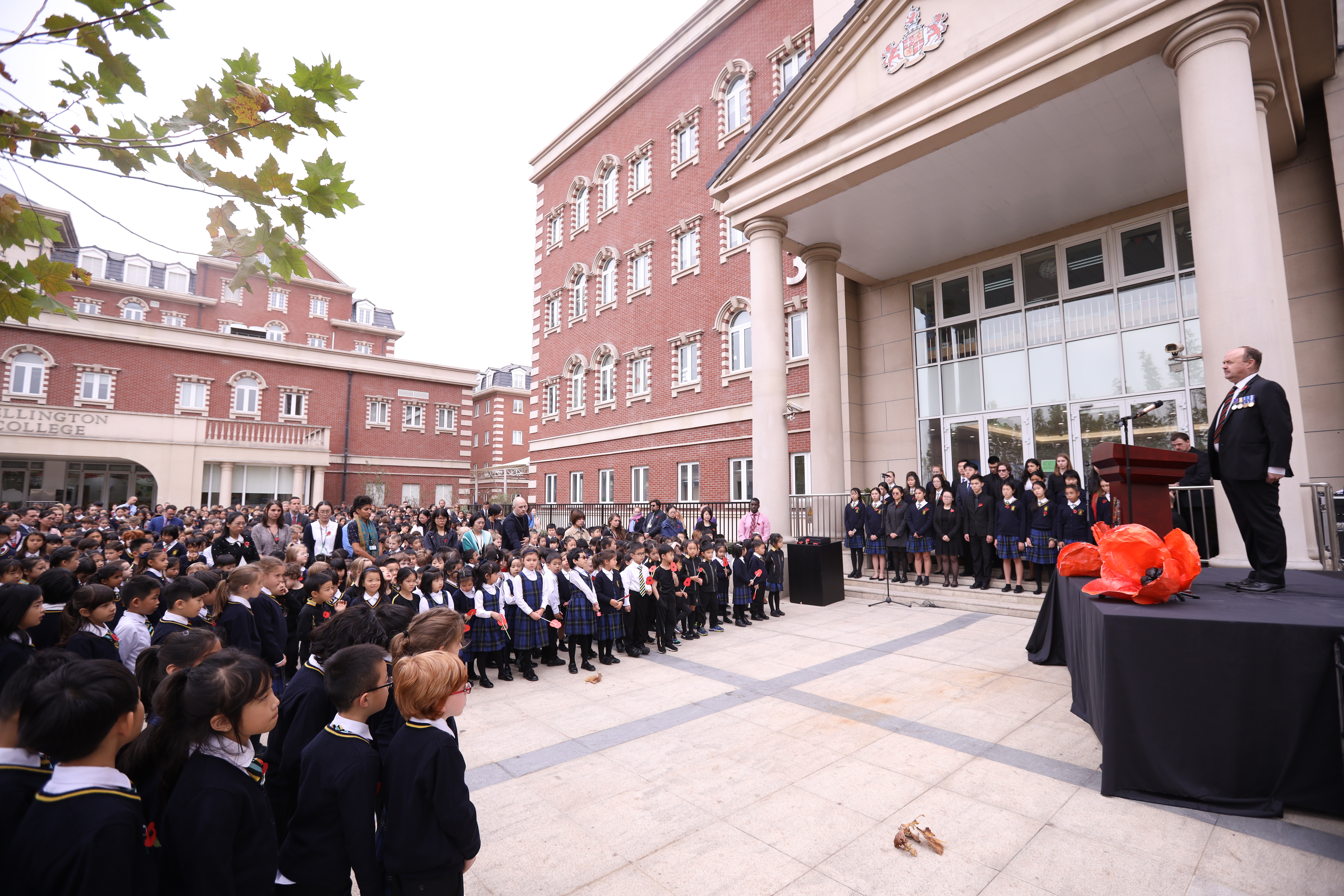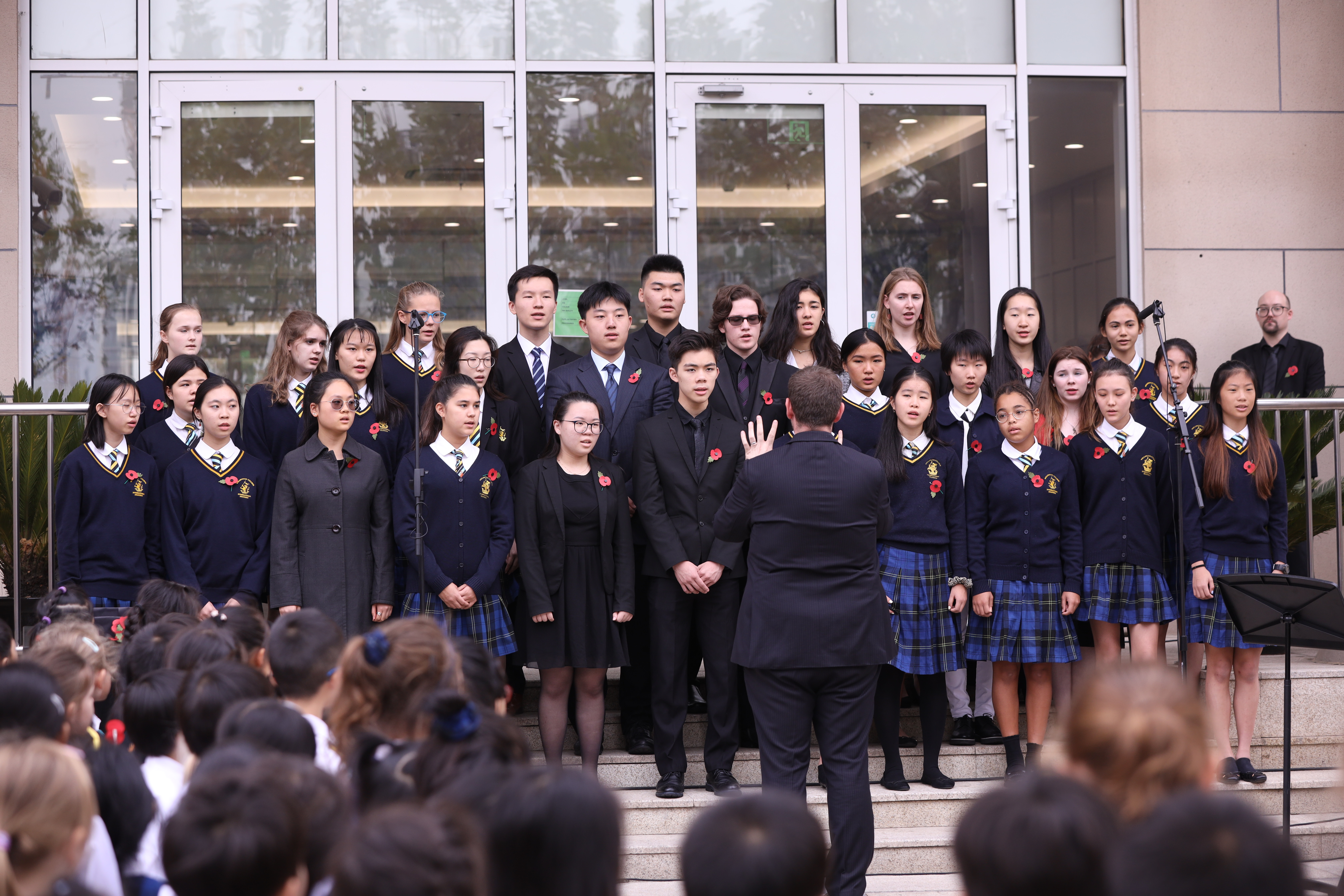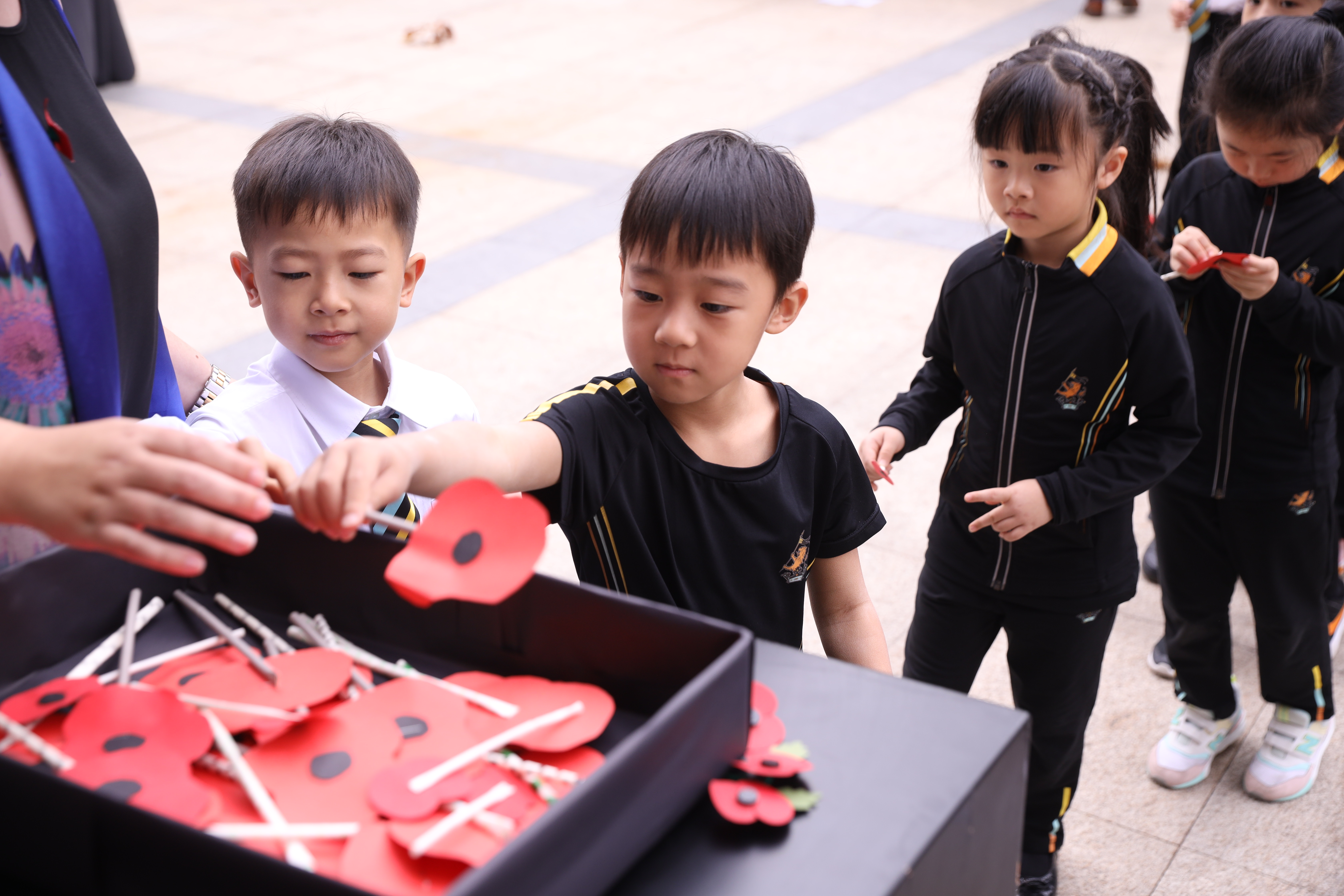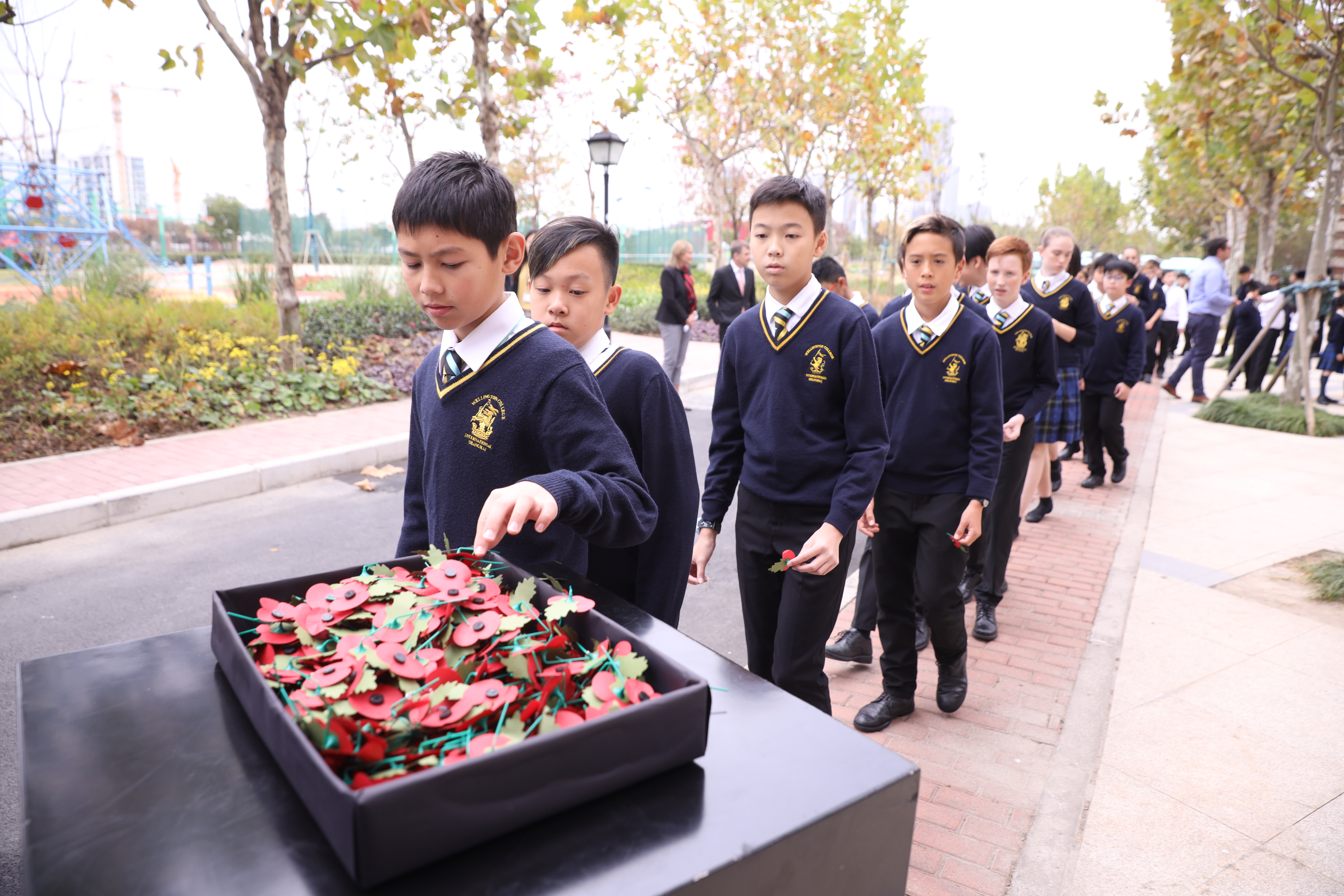Wellington College Shanghai Remembrance Day
12 Nov 2019

Stephen Adams
Head of History
 However, this was not the case elsewhere. In Germany, there was no victory to vindicate the sacrifice; defeat, revolution and perceived humiliation in the post-war treaties left German society divided over the causes of their trauma whilst continued political violence and economic crises destabilised the newly founded republic. Clashes occurred over the design of local memorials with inscriptions calling for pacifism or vengeance in response to the war provoking reaction from the other side. Even the timing of acts of remembrance could be controversial. The post-war republic collapsed in 1933 with the rise of Adolf Hitler, a former soldier of the Great War. Hitler promised order and national unity but in fact established one of the most violent regimes of the twentieth century. When Germany again went to war against Britain and France in 1939, the railway carriage at Compiegne, the location of the signing of the armistice agreement that ended the fighting in 1918, was symbolically chosen by the Nazi forces as the location to accept the French surrender in 1940: humiliation had been overcome and given in return.
However, this was not the case elsewhere. In Germany, there was no victory to vindicate the sacrifice; defeat, revolution and perceived humiliation in the post-war treaties left German society divided over the causes of their trauma whilst continued political violence and economic crises destabilised the newly founded republic. Clashes occurred over the design of local memorials with inscriptions calling for pacifism or vengeance in response to the war provoking reaction from the other side. Even the timing of acts of remembrance could be controversial. The post-war republic collapsed in 1933 with the rise of Adolf Hitler, a former soldier of the Great War. Hitler promised order and national unity but in fact established one of the most violent regimes of the twentieth century. When Germany again went to war against Britain and France in 1939, the railway carriage at Compiegne, the location of the signing of the armistice agreement that ended the fighting in 1918, was symbolically chosen by the Nazi forces as the location to accept the French surrender in 1940: humiliation had been overcome and given in return.
 Acts of remembrance in inter-war Germany, as well as in several other conflicts that followed the Great War, from Northern Ireland to the Middle East, did not promote healing or reconciliation either within the nation or between former enemies. Some of them contributed to the development of powerful historical myths, reflected and reinforced grievances and divisions, and sustained a sense of victimhood. Yet it is not easy or necessarily desirable to choose not to remember; history is to society what memory is to the individual. Refusal to acknowledge the past when we are directly connected to it seems unnatural; groups have a need to memorialise their dead and may quite rightly demand acknowledgement of historical injustices inflicted on them. How then might we reconcile the potential tension between the collective need for remembrance without condemning communities to feel the pain of their historical wounds? The German experience of reconciliation following the second world war is illustrative.
Acts of remembrance in inter-war Germany, as well as in several other conflicts that followed the Great War, from Northern Ireland to the Middle East, did not promote healing or reconciliation either within the nation or between former enemies. Some of them contributed to the development of powerful historical myths, reflected and reinforced grievances and divisions, and sustained a sense of victimhood. Yet it is not easy or necessarily desirable to choose not to remember; history is to society what memory is to the individual. Refusal to acknowledge the past when we are directly connected to it seems unnatural; groups have a need to memorialise their dead and may quite rightly demand acknowledgement of historical injustices inflicted on them. How then might we reconcile the potential tension between the collective need for remembrance without condemning communities to feel the pain of their historical wounds? The German experience of reconciliation following the second world war is illustrative.
 The initial response to the trauma of defeat in 1945, the material destruction and partition of the state, and the growing comprehension of the enormity of the crimes, was a collective suppression of guilt to focus on the immediate task of reconstruction. It was not until the late 1950s that Germans could properly begin to engage in reconciliation with the victims of the crimes of the Third Reich. The Frankfurt Auschwitz trials of 1963-65 were a significant moment, being the first major Nazi war crime trials pursued not by the victorious Allies but by the Germans themselves. Grassroots reconciliation efforts to reach out to the victims of the Holocaust from different German faith groups were embraced by political leaders with Konrad Adenauer beginning negotiations with Israel in the late 1950s about monetary compensation to its victims, a first step aimed at ‘easing the way to the spiritual settlement of infinite suffering’. Efforts at reconciliation continued under subsequent chancellors. In Poland, on a cold wet day in December 1970, Chancellor Willy Brandt laid a wreath at the memorial of the Jewish ghetto in Warsaw. Brandt fell to his knees in front of the memorial and remained fully still for half a minute on the wet stone floor. Brandt was a man who had resisted Hitler and owned no direct responsibility for the Nazi atrocities, but took on the full weight of their actions, the first German head of government to adopt a clear stance that ‘no German is free of history.’ In Berlin, there are countless memorials and physical reminders to mark the arrest of Jews or indicate where families lived before their persecution by the Third Reich; former concentration camps have become sites of memorialisation and education, the war and holocaust are central aspects of the history curriculum. Today, commemoration of the Second World War is understandably low key, but unlike in 1918, it proceeds from the assumption that defeat in 1945 marked Germany’s own day of liberation.
Germany has its own unique ongoing relationship with Israel and Poland, but can thinking about the complex relationship between history, commemoration, and reconciliation help us better understand some of the wider tensions that colour the present-day politics of east Asia but have their origins in the wars and atrocities of the twentieth century? Several lessons suggest themselves.
The initial response to the trauma of defeat in 1945, the material destruction and partition of the state, and the growing comprehension of the enormity of the crimes, was a collective suppression of guilt to focus on the immediate task of reconstruction. It was not until the late 1950s that Germans could properly begin to engage in reconciliation with the victims of the crimes of the Third Reich. The Frankfurt Auschwitz trials of 1963-65 were a significant moment, being the first major Nazi war crime trials pursued not by the victorious Allies but by the Germans themselves. Grassroots reconciliation efforts to reach out to the victims of the Holocaust from different German faith groups were embraced by political leaders with Konrad Adenauer beginning negotiations with Israel in the late 1950s about monetary compensation to its victims, a first step aimed at ‘easing the way to the spiritual settlement of infinite suffering’. Efforts at reconciliation continued under subsequent chancellors. In Poland, on a cold wet day in December 1970, Chancellor Willy Brandt laid a wreath at the memorial of the Jewish ghetto in Warsaw. Brandt fell to his knees in front of the memorial and remained fully still for half a minute on the wet stone floor. Brandt was a man who had resisted Hitler and owned no direct responsibility for the Nazi atrocities, but took on the full weight of their actions, the first German head of government to adopt a clear stance that ‘no German is free of history.’ In Berlin, there are countless memorials and physical reminders to mark the arrest of Jews or indicate where families lived before their persecution by the Third Reich; former concentration camps have become sites of memorialisation and education, the war and holocaust are central aspects of the history curriculum. Today, commemoration of the Second World War is understandably low key, but unlike in 1918, it proceeds from the assumption that defeat in 1945 marked Germany’s own day of liberation.
Germany has its own unique ongoing relationship with Israel and Poland, but can thinking about the complex relationship between history, commemoration, and reconciliation help us better understand some of the wider tensions that colour the present-day politics of east Asia but have their origins in the wars and atrocities of the twentieth century? Several lessons suggest themselves.
 Firstly, acts of remembrance and sites of mourning are most useful when they are sincere, inclusive and grounded in historical accuracy. Historians have their own special responsibility here to deconstruct national myths rather than to reinforce them.
Firstly, acts of remembrance and sites of mourning are most useful when they are sincere, inclusive and grounded in historical accuracy. Historians have their own special responsibility here to deconstruct national myths rather than to reinforce them.
 Secondly, reconciliation is a process that requires time. Nations should actively and critically engage with the difficult questions about their own history, but this may be the task of later generations sufficiently distant from events to have no direct responsibility for them, yet sufficiently connected for their meaning to matter. This implies our relationship with history and its moral burdens is much stronger and ongoing than it might otherwise seem.
Secondly, reconciliation is a process that requires time. Nations should actively and critically engage with the difficult questions about their own history, but this may be the task of later generations sufficiently distant from events to have no direct responsibility for them, yet sufficiently connected for their meaning to matter. This implies our relationship with history and its moral burdens is much stronger and ongoing than it might otherwise seem.
 Thirdly, the difficulties of facing up to a blighted past and initiating reconciliation call for political leaders with moral courage. We should acknowledge the efforts of those who actively work for reconciliation and do not marginalise the claims of victims on the basis that the current state was not the direct perpetrator of past crimes.
Finally, and perhaps most importantly, reconciliation requires goodwill on both sides. In the case of Germany’s attempts to reconcile victims were magnanimous in their reactions and open to reconciliation. Germany was grateful that the hand of reconciliation was extended by the people who had suffered most from its actions.
Thirdly, the difficulties of facing up to a blighted past and initiating reconciliation call for political leaders with moral courage. We should acknowledge the efforts of those who actively work for reconciliation and do not marginalise the claims of victims on the basis that the current state was not the direct perpetrator of past crimes.
Finally, and perhaps most importantly, reconciliation requires goodwill on both sides. In the case of Germany’s attempts to reconcile victims were magnanimous in their reactions and open to reconciliation. Germany was grateful that the hand of reconciliation was extended by the people who had suffered most from its actions.
 Few wars reach neatly punctuated conclusions. Let us take the opportunity offered by 11th November to remember the victims of all wars and make us determined in our own efforts not to repeat them.
Few wars reach neatly punctuated conclusions. Let us take the opportunity offered by 11th November to remember the victims of all wars and make us determined in our own efforts not to repeat them. Related Articles

Summer Camp: An enriching experience at Wellington College UK08 Aug 2023
This summer, pupils of Wellington and Huili schools from China and Thailand gathered at Wellington College UK for an enriching and unforgettable camp experience led by College staff and with the supp
Read More

Embracing the future: How we are leveraging AI at Wellington21 Jun 2023
Tobias OyugiHead of Computer Science It is 2023 and the largest technology companies are once again competing fiercely to stay ahead in the rapidly changing world of tech innovation. We all relied he
Read More
_1686810423959.jpg?x-oss-process=image/interlace,1/resize,m_lfit,w_1200/quality,q_90/format,webp)
Ignite your child’s spark with Wellington College Summer Camps01 Jun 2023
✦ ✦ ✦ ✦ ✦ ✦ ✦ ✦ ✦ Summer break can be a time to relax, but it can also be a great time for exploration, enrichment and personal growth. That is why several Wellington College China schools offer summ
Read More




